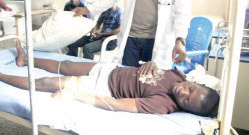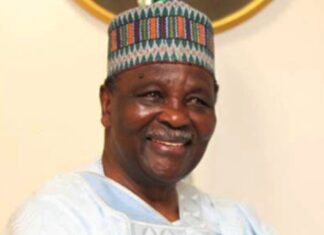By Temitope Ojo
Today makes it exactly one year that Muhammadu Buhari assumed office as president after his stint as military head of state between 1983 and 1985.
The expectation of Nigerians across every sector was very high when he was sworn in on May 29, 2015.
Critical sectors like the economy, power, security, education, housing, and health had been greatly challenged.
Before the exit of the past government, medical experts agreed that it addressed several problems in the health sector. However, a lot was left undone.
 One major issue was providing the Health Act a framework and structure for healthcare delivery. Stakeholders said the implementation must be driven and well guided by all involved to achieve the stated objectives.
One major issue was providing the Health Act a framework and structure for healthcare delivery. Stakeholders said the implementation must be driven and well guided by all involved to achieve the stated objectives.
The primary and secondary tiers of healthcare delivery were another issue. They were less functional. The tertiary tier was responsible for practically all meaningful health service delivery in many states.
Teaching hospitals cannot perform their traditional roles when they take on primary and secondary tiers functions and duties.
Internal brain drain also prevented health professionals from taking up jobs at primary and secondary tiers.
Observers said unless laws are enacted to enable health professionals earn equitably, whether they work for the federal or state governments, the primary and secondary tiers of healthcare will remain underdeveloped.
Steven Oluwole, president of the Medical and Dental Consultants Association of Nigeria (MDCAN), noted the importance of continued training and development of staff in all fields in the health services to make the Nigerian system competitive and attractive such that foreigners will seek healthcare in the country.
“Government policies must promote harmony among all professionals in the healthcare services and also initiate and support research to develop local areas of interest that international agencies will usually ignore,” Oluwole added.
Buhari promised during the election campaign to:
• Prioritise the reduction of the infant mortality rate substantially; reduce maternal mortality rates to the levels acceptable by the World Health Organisation; reduce HIV/AIDS and other infectious diseases drastically and improve life expectancy by an additional 10 years on average through the National Healthy Living Programme.
• Increase the number of physicians from 19 per 1,000 population to 50 per 1,000 through deliberate medication education as epitomised by nations such as Ghana. Increase in national health expenditure per person per annum to about N50,000 (from the less than N10,000 currently).
• Increase the quality of all federal government owned hospitals to world class standard by 2019.
• Invest in cutting edge technology such as telemedicine in all major health centres in the country through partnership programmes with communities and the private sector.
• Provide free ante-natal care for pregnant women; free health care for babies and children up to school going age and for the aged; and free treatment for those afflicted with infectious diseases such as tuberculosis and HIV/AIDS;
• Boost local manufacture of pharmaceuticals and make non adulterated drugs readily available.
• Set an effective prosecution and punishment system for those importing or adulterating drugs.
• Enhancement of the Epidemiological Units/Centres for Disease Control to global standards in containment of disease outbreaks, proper vaccine storage, and research.
• Create an insurance policy for journalists as the nation faces hard times and journalists face more dangers in the discharge of their investigative work, to educate Nigerians in their rights and responsibilities.
But a year on, experts say the Buhari administration is yet to make any positive impact in the health sector.
One major area begging for help is funding of the health sector. And though the government has announced that N221.7 billion would be spent on health in 2016 as part of the initiative to improve the healthcare delivery, inadequate political commitment remains a major barrier to the attainment of adequate financing of healthcare.
This has led to poor funding of health in general, and primary healthcare in particular.
Making the assertion in Lagos, experts from the health sectors called for adequate funding for efficient healthcare delivery.
Akin Osibogun, former chief medical director of Lagos University Teaching Hospital (LUTH), said: “It should be the concern to the government to ensure a high level of efficiency and accountability in the system by developing a fair and sustainable financing system.
“The government should promote equity and access to quality and affordable healthcare, and the overall goal is to ensure that adequate and sustainable funds are available for healthcare delivery.’’
Another area that has also received knock is the plan by the government to “sell” public health institutions, which was confirmed in a document prepared by the Federal Ministry of Health in November 2014, entitled “Recommendations for a National Policy on Incentivising Healthcare Investments”.
Because of the success of reforms in the telecom, energy and banking sectors, advocates of the sale option believe it will bring in additional private capital that will encourage better quality care at the lowest cost and improve benefits to all stakeholders.
If the government goes ahead with the plans, apex public health institutions like the LUTH, University of Nigeria Teaching Hospital (UNTH) Enugu, University College Hospital (UCH) Ibadan, Ahmadu Bello University Teaching Hospital (ABUTH) Zaria, among others, will be put up for sale or rather privatisation, soon.
However, health workers have rejected such plans.
In the past one year, the medical sector was buffeted by strikes and dilapidated infrastructure and equipment, which made medical tourism a household word in the country.
Doctors and other workers in the public service in many states were owed several months of salary and unemployment raged against the souls of ordinary Nigerians.
With years of little or no improvement of healthcare services at primary health centres and general hospitals, teaching hospitals meet the clinical health needs of many Nigerians especially those who cannot afford private hospitals.
Thousands of people, who voted for change, have continued to die from preventable and curable health conditions; health commodities like drugs and reagents are getting expired while the remaining little confidence in the health sector continues to get eroded.
Ude Eze, a public health physician, health policy advocate and development consultant, asked Buhari not to wait for the total collapse of healthcare before he implements his ‘change’ agenda.
He urged him to do everything necessary to deliver on all his promises in the remaining three years to meet his pre-election billing as the one who can solve Nigeria’s problems.











